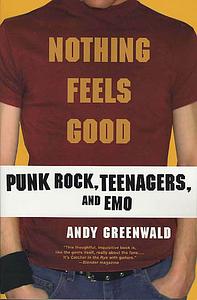Take a photo of a barcode or cover
The first two-thirds of this book are fantastic. It talks about titans in the emo music scene such as Rites of Spring, Sunny Day Real Estate, Jimmy Eat World, etc. and how they began to change and essentially commercialize emo music into the mainstream. The last third of this book however is almost entirely about Dashboard Confessional. It's not that that's a bad thing, it just threw me for a loop, and I wound up longing for more than just a one-hundred page plus love note about the band.
funny
informative
inspiring
lighthearted
medium-paced
This is my second time reading this book.
I like it better than I did the first time.
I like it better than I did the first time.
a great nostalgia trip. the book summarizes my life as a a 20-year-old in the early aughts and im happy to revisit it nearly 20 years later. chris carrabba can still kick it and andy greenwald hosts one of my favorite podcasts. we’re all aging beautifully, no?
Oof. Incredibly outdated now, but provides a good insight into the early days of emo up until about 2001-2. Does make it super apparent that it’s always been privileged white boys moaning and thinking too highly of themselves. There’s also a big section on LiveJournal, which is amazingly cringe.
I would suggest this book to a person who is just beginging learn about the genre of emo. I would hand this book to a kid today who grew up thinking that the acoustic guitar and whiney voices they heard was all the emo ever was. Sure, it's not the greatest exmeplar of a historically accurate novel, but it's well written and funny. I am an English Major and I always keep a pencil with me when reading and I found myself underling passages I liked and circling bands I didn't know. I ended up compiling that list and finding some great music! I don't think this book should be the bible of emo or the end all be all of music books, but I think it is a good start.
Yaaaaawn....reads like an extra-long Rolling Stone article that needs editing.
2.5 stars. It was ok. Didn't finish it all because it was for a uni assignment. There is a line about the way men talk about women through their lyrics that really irked me. "Thankfully, violent fantasies such as these are prevalent but not dominant" ... Yikes
Nothing Feels Good is full of interesting content, great anecdotes and paints a digestible timeline of emo from the early 2000s. Interviews with band members and label owners are insightful and paint an interesting picture of a sub culture that changed the face of punk music forever.
However, Greenwald's insistence of commenting on women's bodies throughout the book, along with a chapter about how "girls just can't get Emo music sung by guys, and guys can't get Emo music sung by girls" makes this book very very dated, paints the author as a chauvinistic half wit, and a lot of the fan's he interviews as incels. I found myself getting very frustrated throughout the book when Greenwald completely pointlessly comments on a fan's weights, almost abandoning several times as a result.
I found myself hating the narrator, finding him pompous, judgemental and utterly in love with himself. He appears to see himself as some sort of Emo Capote, with all the delivery of a 15 year old fancying himself as the next Salinger.
The last 120 pages being exclusively about Dashboard Confession, and then about chatrooms makes this book seem like a short history of Emo music, with a long history of Dashboard Confessional slapped on the end in order to bring the word count up.
However, Greenwald's insistence of commenting on women's bodies throughout the book, along with a chapter about how "girls just can't get Emo music sung by guys, and guys can't get Emo music sung by girls" makes this book very very dated, paints the author as a chauvinistic half wit, and a lot of the fan's he interviews as incels. I found myself getting very frustrated throughout the book when Greenwald completely pointlessly comments on a fan's weights, almost abandoning several times as a result.
I found myself hating the narrator, finding him pompous, judgemental and utterly in love with himself. He appears to see himself as some sort of Emo Capote, with all the delivery of a 15 year old fancying himself as the next Salinger.
The last 120 pages being exclusively about Dashboard Confession, and then about chatrooms makes this book seem like a short history of Emo music, with a long history of Dashboard Confessional slapped on the end in order to bring the word count up.





